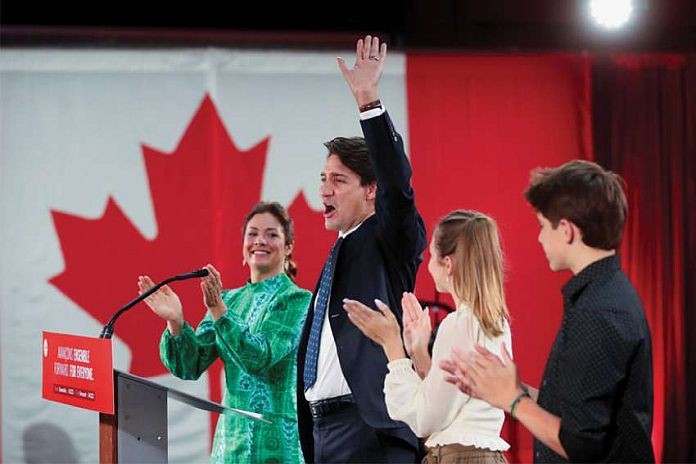By Brian Dryden
OTTAWA, Canada, (Canadian Catholic News) – It was status quo come election night as save for a few minor seat changes, Canada’s new parliament will mirror the one it replaced.
The results of the September 20 election are almost the exact same as the 2019 election when Justin Trudeau’s majority was reduced to a minority. At The Register’s press time, with some votes still being counted, the Liberals had taken 158 seats, the Conservatives 119, the Bloc Quebecois 34, the NDP 25 and the Greens two.
Despite this, Trudeau said the result is a “clear mandate” for his government going forward.
“What we’ve seen tonight is that millions of Canadians have chosen a progressive plan,” Trudeau said in his victory speech.
“Some have talked about division, but that’s not what I see,” Trudeau said. “I see Canadians, standing together. Together, in your determination to end this pandemic. Together for real climate action, for $10-a-day child care, for homes that are affordable for middle-class families. For our shared journey on the path of reconciliation.”
Missing from Trudeau’s victory speech and for the most part from the election campaign was a topic important to Catholics and others of faith: religious freedom. Trudeau is not alone in neglecting this. Each party abdicated their responsibility to protect the rights of all Canadians by buying into the viewpoint that a law — Quebec’s Bill 21 — that bans the wearing of religious symbols in Quebec by public servants is no one’s business except for the province of Quebec.
Quebec’s so-called secularism law Bill 21, which was adopted in 2019, was barely addressed during most of the federal election campaign save for a question asked of Bloc Quebecois leader Yves-Francois Blanchet by the moderator of the English leaders’ debate on September 9. It caused a firestorm in Quebec when the tone of the question prompted criticism that the question was an anti-Francophone attack on Quebec. Not only did Blanchet and Quebec Premier Francois Legault say this, but Trudeau, Conservative leader Erin O’Toole and NDP leader Jagmeet Singh echoed that view as well.
If Canada’s federal party leaders won’t speak out against Bill 21 during a federal election, then when will they ever stand up for religious freedom, the former head of Canada’s religious freedom office asked.
“Religious freedom is not just any freedom,” said Andrew Bennett, program director for religious freedom at the faith-based think tank Cardus. “It is one of the fundamental freedoms.”
Bennett, who was Canada’s Ambassador for Religious Freedom when he headed up the short-lived Office of Religious Freedom established by the Conservative government of Stephen Harper in 2013 (it was disbanded by the Liberals in 2016), said all of the parties were afraid of speaking out against the bill because they feared hurting their electoral chances in Quebec.
“It is a matter of principle. If we can’t stand up in defense of religious freedom in this instance, then when will we stand up?”
Read the full story here.






